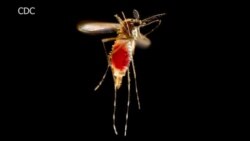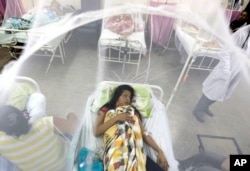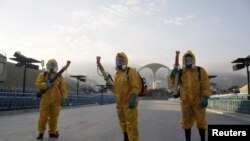Zika in Latin America. Yellow fever in Africa. Dengue across the tropics. Three diseases on the rise. All three carried by one mosquito: Aedes aegypti.
Then why are schoolchildren raising and releasing these mosquitoes in Townsville, Australia, in a state that regularly suffers dengue outbreaks?
"To be honest, it sounded a little counter-productive," said Townsville science teacher Michael Browne.
But Browne and his students are part of a new strategy to fight dengue and other mosquito-borne diseases. The insect eggs they take home are infected with harmless bacteria called Wolbachia. The bacteria live inside the mosquitoes' cells and, in ways that are not entirely clear, block the insects from transmitting viruses including dengue, chikungunya and Zika.
Over the last five years, Scott O'Neill at Monash University and his colleagues have been introducing Wolbachia-infected mosquitoes in neighborhoods in Townsville and Cairns. And it seems to be working.
"In all of those areas, we haven't seen any dengue transmission occurring, but occurring in neighboring areas," he said.
It's promising, but it's not proof. A study underway in Yogyakarta, Indonesia, aims to show whether Wolbachia-infected mosquitoes actually can stop dengue.
The flies have it
The idea that these bacteria could fight mosquito-borne diseases started in the 1980s, with fruit fly researchers comparing apples to oranges.
Fruit flies from northern California prefer apples. Southern California flies prefer oranges. But it's not just a matter of taste. Michael Turelli and colleagues at the University of California, Davis, found that when they raised flies on their respective preferred fruit, they lay more eggs and more of those eggs survive to adulthood.
Turelli's group wanted to know if the difference was genetic. But something strange happened when they tried to breed them. When they bred northern females with southern males, they didn't get any offspring.
"These things were behaving as if they were different species," Turelli said.
The key was Wolbachia. Southern California flies had it. Northern flies didn't. And for reasons scientists still don't understand, Wolbachia kills the offspring of insects that are not carrying the bacteria.
Scientists saw an opportunity. The original idea was to release enough infected males to mate with all the uninfected females in an area, essentially sterilizing them.
That's basically the plan for University of Kentucky researchers. After successful small-scale tests in Kentucky, New York and California, they're seeking to register their Wolbachia-infected Asian tiger mosquitoes as a biopesticide.
"It's non-chemical. It's not toxic," said University of Kentucky entomologist Stephen Dobson. "It's a naturally occurring bacterium. There's no genetic modification involved."
‘Incredible luck’
But what makes Wolbachia such a promising tool against Zika, dengue and other viruses is something else entirely.
Again, credit for the discovery goes to fruit fly researchers. Scientists at Cambridge University were looking for genes that protected flies from viruses. They found Wolbachia instead.
It was "just incredible luck that this thing we're studying for one purpose turned out to have this other behavior," Turelli said.
It took a lot of painstaking work with microscopic needles to get Wolbachia from fruit flies into Aedes aegypti, the mosquitoes that transmit Zika and dengue. O'Neill wrote in Scientific American that it's like poking a balloon with a knitting needle, then removing the needle without popping the balloon.
"It's an extraordinary pain," Turelli said. "It's still massively, massively difficult."
But it only has to work once. The bacteria are passed on in the mosquito's eggs. And since the bacteria essentially sterilize uninfected insects, infection quickly spreads through the population. And it stays there. Most of the mosquitoes in Townsville and Cairns are infected five years after O'Neill first introduced the bacteria.
That kind of long-term efficacy could be a huge bonus, he said.
"It's very hard to get the money to do very expensive mosquito control programs every year, particularly when they're not always that effective," he noted. "Brazil spends more than $1 billion per year and still has some of the highest dengue levels in the world."
Wolbachia Warriors
O'Neill and his team have experiments underway in Brazil and Colombia. Everywhere they work, they put a lot of effort into getting the community on board. Hence the mosquito-rearing schoolkids in Townsville.
They're called Wolbachia Warriors. The program offers teachers ways to work the mosquitoes into the science curriculum.
As a child, O'Neill said, he used to see ads in the back of American comic books for sea monkeys — brine shrimp sold as pets. But living in Australia, he couldn't order them.
"I was sort-of upset with that then," he said.
Perhaps the Wolbachia Warriors program is a bit of redemption, with a purpose.
"What kid doesn't like having a pet?" asked Browne, the science teacher. "Especially a wriggly one that can hopefully grow up to help eliminate dengue fever."








